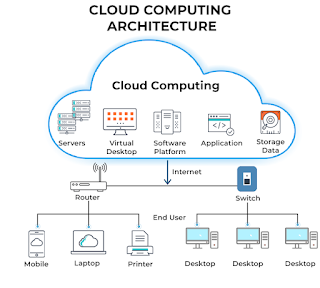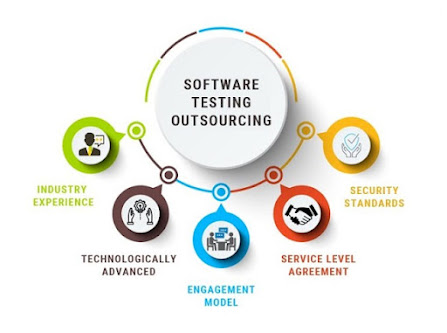Cloud Computing and It's Benefit: Unlocking the Potential of Your Business
Cloud computing has revolutionized the way businesses
operate, by allowing them to access computing resources over the internet. With
cloud computing, companies can save on hardware costs, scale up or down as needed,
and access advanced software and services without the need for expensive
infrastructure.
What is
Cloud Computing?
Cloud computing is the delivery of computing services over
the internet, including servers, storage, databases, networking, software,
analytics, and intelligence. Instead of owning and maintaining expensive
hardware and infrastructure, businesses can rent access to these resources on a
pay-as-you-go basis, allowing them to scale up or down as needed.
5
Benefits of Cloud Computing:
There are 5
benefits of cloud computing. Below is list of cloud computing benefits.
Scalability: Cloud computing allows for easy scalability,
which means that you can quickly and easily add or remove resources to match
the demands of your business. This allows you to easily adjust your
infrastructure as your business grows or changes.
Cost-effective: Cloud computing can be a cost-effective
solution because you only pay for the resources you use, rather than having to
invest in expensive hardware and infrastructure that you may not fully utilize.
Additionally, the cost of maintenance and upgrades is handled by the cloud
service provider.
Accessibility: Cloud computing allows you to access your
data and applications from anywhere with an internet connection, which means
you can work from anywhere, anytime. This can increase productivity and allow
for more flexibility in work arrangements.
Security: Cloud service providers often have advanced
security measures in place to protect your data and applications, which can be
especially important for businesses handling sensitive information.
Collaboration: Cloud computing can improve collaboration
within teams because it allows for easy sharing of files and data, as well as
real-time collaboration on documents and projects. This can lead to increased
productivity and efficiency.
Types of
Cloud Computing
There are three main types
of cloud computing: Infrastructure as a Service (IaaS), Platform as a
Service (PaaS), and Software as a Service (SaaS).
Infrastructure
as a Service (IaaS)
Infrastructure as a Service (IaaS) provides businesses with
virtualized computing resources, including servers, storage, and networking,
over the internet. IaaS allows businesses to rent virtualized infrastructure on
a pay-as-you-go basis, rather than purchasing and maintaining their own
hardware.
Examples of IaaS providers include Amazon Web Services
(AWS), Microsoft Azure, and Google Cloud Platform.
IaaS is ideal for businesses that need a flexible and
scalable infrastructure, without the cost and complexity of managing their own
hardware.
Platform
as a Service (PaaS)
Platform as a Service (PaaS) provides businesses with a
complete platform for developing, running, and managing applications over the
internet. PaaS providers offer tools and frameworks that developers can use to
build, deploy, and manage their applications, without needing to worry about
the underlying infrastructure.
Examples of PaaS providers include Heroku, Google App
Engine, and Microsoft Azure.
PaaS is ideal for businesses that want to develop and deploy
applications quickly and easily, without the need for specialized IT expertise.
Software
as a Service (SaaS)
Software as a Service (SaaS) provides businesses with access
to software applications over the internet, without needing to install or
maintain the software themselves. SaaS providers offer a range of applications,
including email, customer relationship management (CRM), and enterprise
resource planning (ERP).
Examples of SaaS providers include Salesforce, Microsoft
Office 365, and Google Workspace.
SaaS is ideal for businesses that want to access advanced
software applications without the cost and complexity of managing their own
software and infrastructure.
What is
Cloud Hosting?
Cloud hosting is a type of hosting solution that uses
virtual servers to host websites or applications. The virtual servers are
hosted on a cloud infrastructure, which means that they are spread across
multiple servers and data centers. This ensures that the website or application
is always available and accessible from anywhere in the world.
Advantages
of Cloud Hosting Solution:
Scalability: One of the main advantages of cloud hosting is
scalability. With traditional hosting, you are limited by the resources
available on a single server. If your website or application needs more
resources, you will have to upgrade to a higher plan or switch to a more powerful
server. With cloud hosting, you can easily scale your resources up or down
depending on your needs. This means that you only pay for the resources you
need, and you can easily adjust them as your business grows.
Reliability: Cloud hosting is more reliable than traditional
hosting solutions because your website or application is hosted on a cluster of
servers. If one server fails, another server will automatically take over,
ensuring that your website or application stays online. This also means that
you do not have to worry about downtime, as the servers are constantly
monitored and maintained.
Security: Cloud hosting is more secure than traditional
hosting solutions because your website or application is hosted on a virtual
server. This means that your website or application is isolated from other
websites or applications hosted on the same server. This reduces the risk of
security breaches, as hackers cannot gain access to your website or application
by hacking into another website or application hosted on the same server.
Cost-Effective: Cloud hosting is a cost-effective solution
because you only pay for the resources you need. This means that you do not
have to invest in expensive hardware or infrastructure. You also do not have to
worry about maintenance costs, as the cloud hosting provider takes care of all
maintenance and upgrades.
Flexibility: Cloud hosting is a flexible solution because
you can choose the operating system and software that best suits your needs.
This means that you can customize your hosting environment to meet your
specific requirements. You also have the option to add or remove resources as
your business grows and changes.
Final
Thoughts
In conclusion, cloud computing has revolutionized the way
businesses and individuals store, access, and manage their data and
applications. There are three main types of cloud computing: public, private,
and hybrid, each with its own benefits and use cases. Public cloud is a
cost-effective solution for businesses with limited resources, while private
cloud offers greater control and security for sensitive data. Hybrid cloud
provides a combination of both.
Cloud computing offers several benefits, including
scalability, cost-effectiveness, accessibility, security, and collaboration. It
allows businesses to easily adjust their infrastructure as they grow, work from
anywhere with an internet connection, and increase productivity through
real-time collaboration. Additionally, cloud service providers often have
advanced security measures in place to protect data, which can be critical for
businesses handling sensitive information. Overall, cloud computing has
transformed the way we work and manage our digital assets, and its benefits
will continue to shape the future of technology.




Comments
Post a Comment